文章目录
1、支付方式选择 2、交互流程 3、1. 对接准备 2.加密解密 + 签名验签 3.沙箱环境 4、内网穿透 5、二维码 6、下单 7、异步通知回调 8、查询支付结果 9、退款 10、通用版SDK
需求:系统A对接支付宝,实现支持用户扫码支付
1、支付方式选择
对接的API文档:
https://open.alipay.com/api
可选的支付方式有:
扫码付
:出示付款码或者用户扫码付款
APP支付
:在APP中唤起支付宝
手机网站支付
:在移动端网页中唤起支付宝 App 或支付宝网页
电脑网站支付
:在PC端唤起支付宝App或者网页登录支付宝账户
刷脸付
:需硬件支持
商家扣款
:类似每月会员扣款
预授权支付
:冻结对应额度,交易完成后给商家
JSAPI支付
:小程序
这里选择扫码付的方式,点击下单后,返回支付二维码,用户扫码支付。
2、交互流程
画个下单流程的时序图:
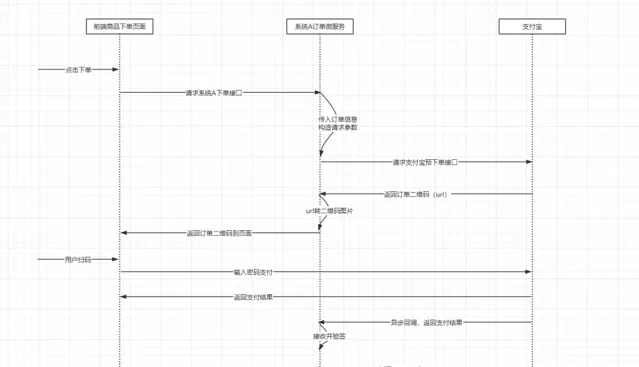
大致流程:
用户下单,系统A组装信息后(订单信息、回调地址、签名),调用支付宝预下单接口,返回二维码链接
系统A将二维码链接转二维码图片
用户扫码,唤醒本地支付宝,完成支付
支付宝返回支付成功信息给用户
支付宝异步通知系统A支付成功的消息(回调地址),如果用户支付成功,支付宝就调用回调地址的API, 回调接口 中自然是系统A收到用户支付成功消息后的动作
上一步如果通知失败,比如网络异常或支付宝调用异步通知接口时系统A正好挂了 ⇒ 可主动调支付宝提供的查询支付结果接口,或者加定时任务轮询来查询交易状态,如3s-5s
还可以考虑在第一步请求支付宝接口时加上二维码的有效时间,过期就重新发起
查询支付结果流程:
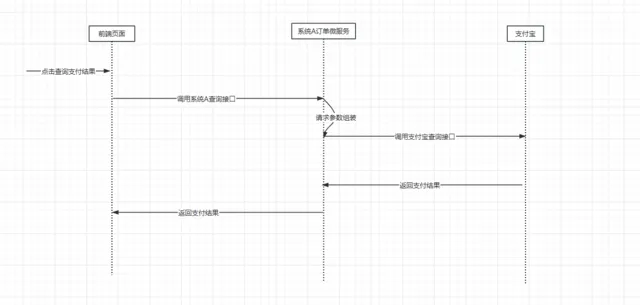
退款流程同上查询支付结果。PS:注意下单、退款过程中,相关订单的业务数据落库到系统A。
3、对接准备
1)加密解密 + 签名验签
支付信息不能在网络上明文传输,以防被篡改。系统A到支付宝的方向,采用:
支付宝公钥加密 + 系统A的私钥签名(系统A做的事)
支付宝私钥解密 + 系统A的公钥验签(收到信息后,支付宝做的事)
同理,支付宝返回支付结果时,就是在支付宝中用系统A的公钥加密+支付宝的私钥签名,传输到系统A后,则是先用支付宝的公钥验签,再用系统A的私钥解密支付结果
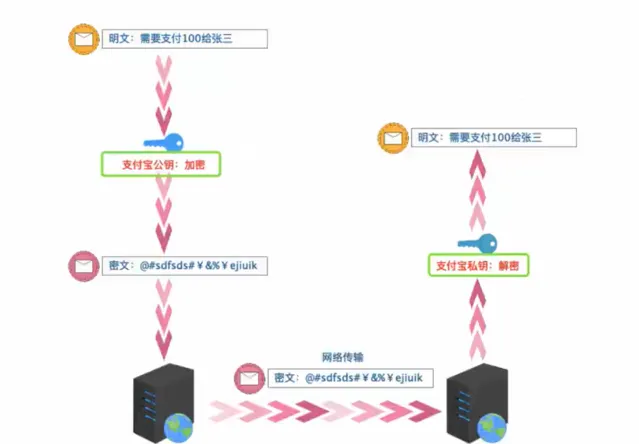
2)沙箱环境
调试过程中,可采用支付宝提供的沙箱环境,点击右上角控制台,登录后选择沙箱:

这里有一套可调试的APPID、系统A的公钥、密钥、支付宝的公钥、支付宝的网关地址,以及商家账户和用户账户(用于后续登录沙箱版本支付宝APP完成支付)
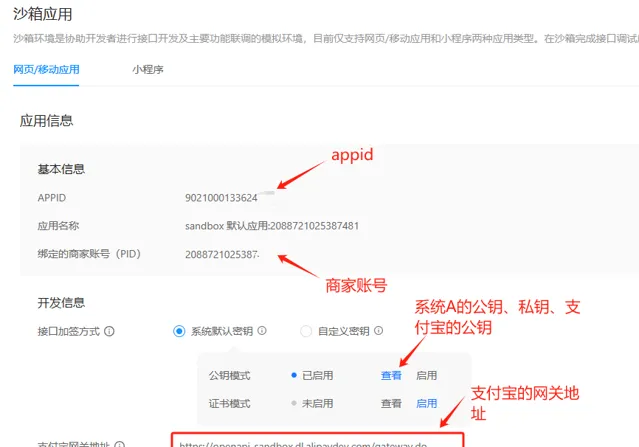
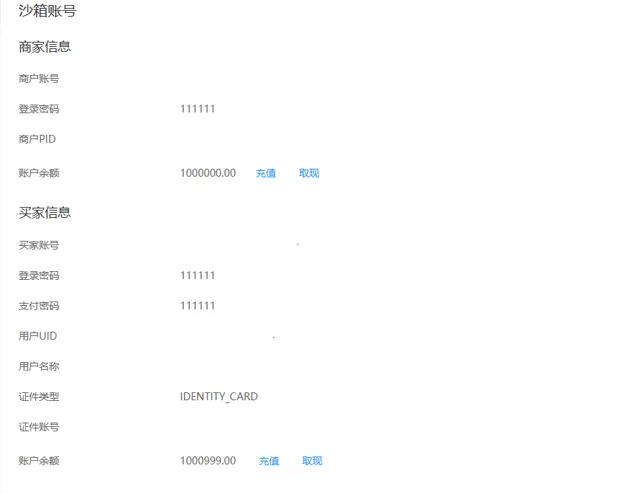
点击【沙箱工具】侧边栏,下载沙箱版支付宝APP,等于上面的买家账户。
3)内网穿透
前面提到,用户支付成功后,支付宝需要回调系统
A接口
来通知系统A,但我的开发环境在内网,支付宝访问不到,考虑做内网穿透,让支付宝通知到一个中转地址,再由中转地址到我的内网。穿透工具选择cpolar,下载地址
https://dashboard.cpolar.com/get-started
,下载后,解压并安装msi包
双击exe文件,执行认证:
cpolar authtoken xxxx
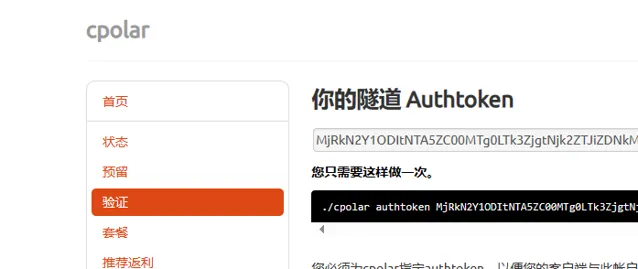
创建隧道,建立链接:
cpolar http 9527
//返回结果
Forwarding http://maggie.cpolar.io -> localhost:9527
Forwarding https://maggie.cpolar.io -> localhost:9527
转发成功。此时,给支付宝访问forward的地址即可,比如系统A的异步通知接口:
localhost:9527/notify
那就是:
http://maggie.cpolar.io/notify
4、二维码
二维码是消息的载体。平时玩可直接在草料二维码UI页面,这里需要给系统A的订单服务用代码生成二维码。二维码中的信息自然是支付宝预下单返回的 url 。
Java生成二维码 可集成zxing库,但这样得自己两层for填充方格子,这里选择hutool工具类库(对zxing的二次封装),引入依赖:
<dependency>
<groupId>cn.hutool</groupId>
<artifactId>hutool-all</artifactId>
<version>5.7.22</version>
</dependency>
<dependency>
<groupId>com.google.zxing</groupId>
<artifactId>core</artifactId>
<version>3.4.1</version>
</dependency>
调用方式:
//生成直到url对应的二维码,宽高均300像素,可到路径,也可到Http响应
QrCodeUtil.generate("https://url/path", 300, 300, "png", httpServletResponse.getOutPutStream());
也可引入QrConfig对象,设置其他属性:
QrConfig config = new QrConfig(300, 300);
//纠错级别
config.setErrorCorrection(ErrorCorrectionLevel.H);
//二维码颜色
config.setBackColor(Color.BLUE);
QrCodeUtil.generate("https://www.baidu.com", config, new File("D:\\code.png"));
5、下单
支付宝提供的SDK 中已经对加签验签逻辑做了封装,使用 SDK 时传入支付宝公钥等内容可直接通过 SDK 自动进行加验签。SDK文档地址:
https://opendocs.alipay.com/open/54/103419?pathHash=d6bc7c2b
。支付宝提供了两种SDK:
通用版SDK
简易版SDK
官网有通用版的API代码示例,这里走简易版的。引入简易版SDK的依赖:
<!-- https://mvnrepository.com/artifact/com.alipay.sdk/alipay-easysdk -->
<dependency>
<groupId>com.alipay.sdk</groupId>
<artifactId>alipay-easysdk</artifactId>
<version>2.2.0</version>
</dependency>
在application.yml配置文件中统一写密钥、通知地址等(生产环境不要将私钥信息配置在源码中,例如配置为常量或储存在配置文件中,这样源码一丢,这些保密信息都泄漏了,放安全区域或服务器,运行时读取即可)
alipay:
easy:
protocol: https
gatewayHost: openapi-sandbox.dl.alipaydev.com
signType: RSA2
appId: 9021000133624745
merchantPrivateKey: MIIEvQIBADANBgkqhkiG9w0B
alipayPublicKey: MIIBIjANBgkqhkiG9w0BAQEFAAOC
notifyUrl: http://maggie.cpolar.io/notify
server:
port: 9527
@ ConfigurationProperties 注解统一读到:
@Configuration
@Data
@ConfigurationProperties(prefix = "alipay.easy")
public class AliPayConfigInfo {
/**
* 请求协议
*/
private String protocol;
/**
* 请求网关
*/
private String gatewayHost;
/**
* 签名类型
*/
private String signType;
/**
* 应用ID(来自支付宝申请)
*/
private String appId;
/**
* 应用秘钥
*/
private String merchantPrivateKey;
/**
* 支付宝公钥
*/
private String alipayPublicKey;
/**
* 支付结果异步通知的地址
*/
private String notifyUrl;
/**
* 设施AES秘钥
*/
private String encryptKey;
}
将配置处理成Config类型的Bean,方便后面传入Config对象:
@Configuration
public class AliPayConfig {
@Bean
public Config config(AliPayConfigInfo configInfo){
Config config = new Config();
config.protocol = configInfo.getProtocol();
config.gatewayHost = configInfo.getGatewayHost();
config.signType = configInfo.getSignType();
config.appId = configInfo.getAppId();
config.merchantPrivateKey = configInfo.getMerchantPrivateKey();
config.alipayPublicKey = configInfo.getAlipayPublicKey();
config.notifyUrl = configInfo.getNotifyUrl();
config.encryptKey = "";
return config;
}
}
写下单接口,响应一个二维码给前端,这里业务数据、订单编号直接写死,只做示意:
@RestController
@Slf4j
public class PayController {
@Resource
private Config config;
/**
* 收银台点击结账
* 发起下单请求
*/
@GetMapping("/pay")
public void pay(HttpServletRequest request, HttpServletResponse response) throws Exception {
Factory.setOptions(config);
//调用支付宝的接口
AlipayTradePrecreateResponse payResponse = Factory.Payment.FaceToFace().preCreate("订单主题:Mac笔记本", "LS123qwe123", "19999");
//参照官方文档响应示例,解析返回结果
String httpBodyStr = payResponse.getHttpBody();
JSONObject jsonObject = JSONObject.parseObject(httpBodyStr);
String qrUrl = jsonObject.getJSONObject("alipay_trade_precreate_response").get("qr_code").toString();
QrCodeUtil.generate(qrUrl, 300, 300, "png", response.getOutputStream());
}
}
6、异步通知回调
异步回调参考文档:
https://opendocs.alipay.com/open/194/103296?pathHash=e43f422e&ref=api
,实现先全放Controller层了:
@RestController
@Slf4j
public class PayController {
@Resource
private Config config;
/**
* 给支付宝的回调接口
*/
@PostMapping("/notify")
public void notify(HttpServletRequest request, HttpServletResponse response) throws Exception {
Map<String, String> params = new HashMap<>();
//获取支付宝POST过来反馈信息,将异步通知中收到的待验证所有参数都存放到map中
Map<String, String[]> parameterMap = request.getParameterMap();
for (String name : parameterMap.keySet()) {
String[] values = parameterMap.get(name);
String valueStr = "";
for (int i = 0; i < values.length; i++) {
valueStr = (i == values.length - 1) ? valueStr + values[i]
: valueStr + values[i] + ",";
}
//乱码解决
valueStr = new String(valueStr.getBytes("ISO-8859-1"), "utf-8");
params.put(name, valueStr);
}
//验签
Boolean signResult = Factory.Payment.Common().verifyNotify(params);
if (signResult) {
log.info("收到支付宝发送的支付结果通知");
String out_trade_no = request.getParameter("out_trade_no");
log.info("交易流水号:{}", out_trade_no);
//交易状态
String trade_status = new String(request.getParameter("trade_status").getBytes("ISO-8859-1"), "UTF-8");
//交易成功
switch (trade_status) {
case"TRADE_SUCCESS":
//支付成功的业务逻辑,比如落库,开vip权限等
log.info("订单:{} 交易成功", out_trade_no);
break;
case"TRADE_FINISHED":
log.info("交易结束,不可退款");
//其余业务逻辑
break;
case"TRADE_CLOSED":
log.info("超时未支付,交易已关闭,或支付完成后全额退款");
//其余业务逻辑
break;
case"WAIT_BUYER_PAY":
log.info("交易创建,等待买家付款");
//其余业务逻辑
break;
}
response.getWriter().write("success"); //返回success给支付宝,表示消息我已收到,不用重调
} else {
response.getWriter().write("fail"); ///返回fail给支付宝,表示消息我没收到,请重试
}
}
}
到此,看下效果,请求下单接口:
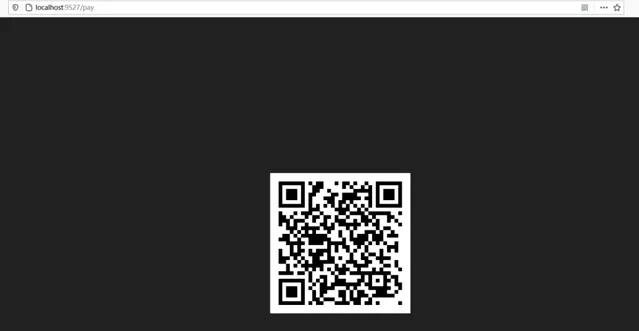
用沙箱版app扫码:
支付,查看余额:
7、查询支付结果
主动查询用户的支付结果,订单编号依然写死:
@RestController
@Slf4j
public class PayController {
@Resource
private Config config;
@GetMapping("/query")
public String query() throws Exception {
Factory.setOptions(config);
AlipayTradeQueryResponse result = Factory.Payment.Common().query("LS123qwe123");
return result.getHttpBody();
}
}

8、退款
退款操作:
@RestController
@Slf4j
public class PayController {
@Resource
private Config config;
@GetMapping("/refund")
public String refund() throws Exception {
Factory.setOptions(config);
AlipayTradeRefundResponse refundResponse = Factory.Payment.Common().refund("LS123qwe123", "19999");
return refundResponse.getHttpBody();
}
}

9、通用版SDK
官方文档就是以这个SDK为例的,贴个代码示例:
private static final String GATEWAY_URL = "https://openapi.alipaydev.com/gateway.do";
private static final String FORMAT = "JSON";
private static final String CHARSET = "UTF-8";
//签名方式
private static final String SIGN_TYPE = "RSA2";
@Resource
private AliPayConfig aliPayConfig;
@Resource
private OrdersMapper ordersMapper;
@GetMapping("/pay") // &subject=xxx&traceNo=xxx&totalAmount=xxx
public void pay(AliPay aliPay, HttpServletResponse httpResponse) throws Exception {
// 1. 创建Client,通用SDK提供的Client,负责调用支付宝的API
AlipayClient alipayClient = new DefaultAlipayClient(GATEWAY_URL, aliPayConfig.getAppId(),
aliPayConfig.getAppPrivateKey(), FORMAT, CHARSET, aliPayConfig.getAlipayPublicKey(), SIGN_TYPE);
// 2. 创建 Request并设置Request参数
AlipayTradePagePayRequest request = new AlipayTradePagePayRequest(); // 发送请求的 Request类
request.setNotifyUrl(aliPayConfig.getNotifyUrl());
JSONObject bizContent = new JSONObject();
bizContent.set("out_trade_no", aliPay.getTraceNo()); // 我们自己生成的订单编号
bizContent.set("total_amount", aliPay.getTotalAmount()); // 订单的总金额
bizContent.set("subject", aliPay.getSubject()); // 支付的名称
bizContent.set("product_code", "FAST_INSTANT_TRADE_PAY"); // 固定配置
request.setBizContent(bizContent.toString());
// 执行请求,拿到响应的结果,返回给浏览器
String form = "";
try {
form = alipayClient.pageExecute(request).getBody(); // 调用SDK生成表单
} catch (AlipayApiException e) {
e.printStackTrace();
}
httpResponse.setContentType("text/html;charset=" + CHARSET);
httpResponse.getWriter().write(form);// 直接将完整的表单html输出到页面
httpResponse.getWriter().flush();
httpResponse.getWriter().close();
}
具体有业务数据逻辑的对接支付宝接口,可跳转支付宝业务对接:
https://llg-notes.blog.csdn.net/article/details/130357977











